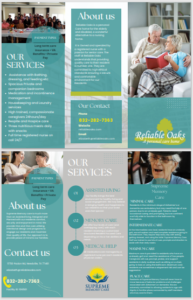“If your loved one is typically very refined, and they being to curse, that’s a sign, Or they love to cook, but can no longer remember the steps to make a favorite meal. It’s memory loss combined with executive functioning that is a hallmark of Alzheimer’s disease,” says Dr. Healy, says Dr. Elaine Healy, a geriatrician and vice president of medical affairs and medical director of United Hebrew of New Rochelle in New York.

memory care
Understanding the topic, coming to terms with its reality, and ability to affect any individual within the stipulated age range as well as taking note of the warning signs will be crucial to managing memory and when to administer Memory care.
In 2020, as many as 5.8 million Americans were living with Alzheimer’s disease. It is also believed that the number of people living with the disease doubles every 5 years beyond age 65 and this number is projected to nearly triple to 14 million people by 2060.
A special report by PubMed Central also discovered that If interventions could delay the onset of the disease by 2 years, after 50 years there would be nearly 2 million fewer cases than projected; if onset could be delayed by 1 year, there would be nearly 800,000 fewer prevalent cases.
From careful research, it’s easy to discover that the biggest key to effectively dealing with Alzheimer’s and dementia is through early detection and delayed progression. Most people tend to ignore these signs or don’t recognize them at all. This may be a result of the emotions that come with accepting the reality of dementia and the effect it could have on a loved one. Even so, dealing with it will do both you and your loved one a whole lot of good in the long run.
Primary care is mostly the first step that patients with memory concerns often take when trying o make inquiries and a special report by Futuremedicine on Neurodegenerative disease Management discovered that:
there is a wide variation in how primary care physicians manage patients with suspected cognitive impairment in current real-world practice. While a few follow guideline recommendations, most do not inquire proactively about the cognitive decline or even discount subjective memory complaints as normal aging, which may result in missed or delayed diagnosis of dementia.
Formal assessment with a validated brief cognitive test is even less common, as even the simple General Practitioner Assessment of Cognition and the mini-Assessment of Cognition [30] take approximately 5 min to administer and score, and the more precise MMSE or Montreal Cognitive Assessment around 15 min.
Laboratory testing for potentially reversible causes of cognitive impairment is inconsistently done and neuroimaging is rarely ordered in primary care settings.
Everything discussed so far buttresses very obvious facts, detection is delayed, people are not aware of the signs, and treatment is not administered.
5 Notable Signs Indicating that a Patient Needs Memory Care
Let’s now take a look at Five notable signs that indicate that a patient needs memory care.
1.Significant change in behavior:
One of the most notable signs of the onset of dementia is a sudden and significant change in the behavior of the patient. These behaviors could be characterized by violence, increased tension, mistrust, accusations, fear, anxiety, and the inability to carry out Daily Living activities.
“Significant is the key word,” says Dr. Healy. “There’s a big drop in functioning. The symptoms include severe memory loss, and difficulty in reasoning, thinking, and problem-solving. They affect an individual’s ability to cope with daily life.” Sometimes, you’ll notice that they are no longer able to straighten out their hair, apply to make up or even forget how to take a bath.
It gets even more worrisome when the caregiver in the scenario is a partner as this could lead to abuse in severe cases. In more diverse cases, aging patients ah experience sundown syndrome and become even more irritated as the sun sets. In any case, you will want to consider giving your loved one some much more advanced form of memory care.
2. Decline in Physical/General health:
When a caregiver spends the majority of his time with the individual in need, it may be difficult to notice the physical decline. Things such as unexplained weight loss, a slumped back, scars and Injuries that they can’t seem to remember, etc. These are all signs that the individual’s safety is at great risk.
You can’t tell what may or may not happen when you aren’t close to the individual. When you see these signs over a long period, then it’s time to take action.
3.Fecal Incontinenc
You probably may have not heard of this or don’t think it’s real. Well, it is…
A study by the International Foundation for Functional Gastrointestinal Disorders shows that Fecal incontinence (FI) affects over 17 million people in the United States on average. It’s also the second most common reason older adults decide to go into assisted living or long-term care facilities.
Fecal Incontinence is simply an inability to control bowel movements which may cause stool leakage and in some cases, complete loss of control entirely. It is caused by many things ranging from muscle weakness to after-effects of surgery, or birth complications.
It’s an often embarrassing topic for most seniors so you would expect some level of apprehensiveness but it can actually be treated and managed rather effectively. It’s not the end of the World.
4.Wandering and disorientation:
Another notable sign of Dementia and Alzheimers could be instances where the individual is unable to remember his way around places. This is often referred to as wandering and is a very common sign.
The individual may lose his way and end up where he doesn’t understand and get very tensed and disoriented. This could lead to heart attacks and other health risks.
Sometimes, the individual y forgets how to do some important things like running a traffic light and forgetting what a signboard means. It would be extremely risky to leave a loved one alone and unattended to in such a condition.
5.The deteriorating state of the Caregiver:
A quick way to know when memory should be administered is when the condition of the patient starts to take a real toll on the caregiver. For example, in a case where one of the partners is the caregiver and you notice scratches or wounds that seem to have come as a result of struggle. Sometimes bitemarks even.
Other than physical signs, if you notice the caregiver is mentally and emotionally unable to cope with the situation, then it’s time you call for much more professional help.
Sometimes caregivers may not want to admit it. Due to emotional attachments, they desperately hold on and suffer within themselves. At such times, Memory really should be considered.
Memory loss in a loved one is what nobody wants to experience. Intact, we all probably wish it wasn’t true and this article wasn’t necessary. Sadly, that isn’t the case.
The numbers will keep growing and unless we pay much more attention to it and look out for the signs early enough, we may become handicapped. The demand for General practitioners is increasing and the supply isn’t sufficient, the earlier you diagnose your loved one, the earlier they get treatment, the happier they are, and the easier it is to manage.
If the diagnosis is Alzheimer’s disease or another form of dementia which has no cure, an early diagnosis is still beneficial,” says Dr. Healy.
“There’s a lot that can be done that can slow the rate of decline, and to help people with these conditions cope with memory loss, maintain their independence, and live long and meaningful lives.”
Consult any of the Certified practitioners and get professional advice on what next steps to take.
You can visit Reliable Oaks Memory Care Village and schedule a meeting right away with your loved one.
Thank you for reading!!

Assisted Living Vs Memory Care – Reliable Oaks
[…] of your loved one and determine whether it’s Assisted Living is sufficient or whether it’s time for Memory Care. An individual without cognitive impairment or even still at the early stages of […]